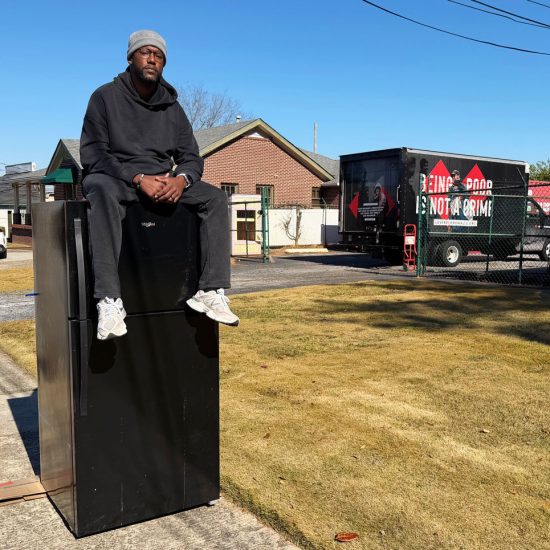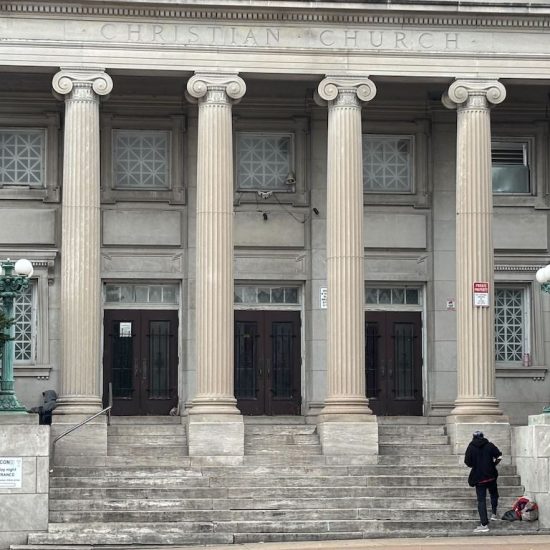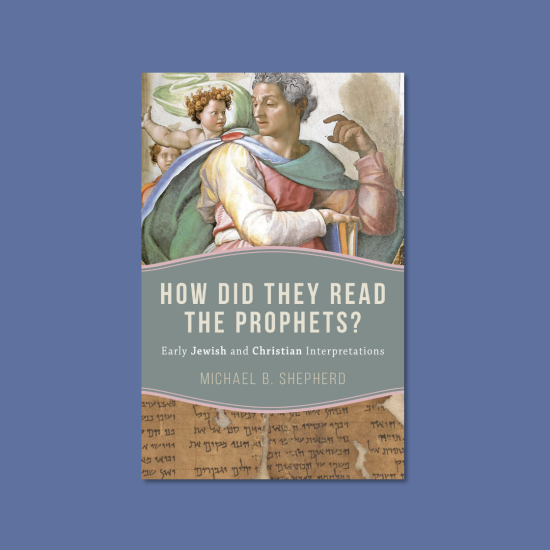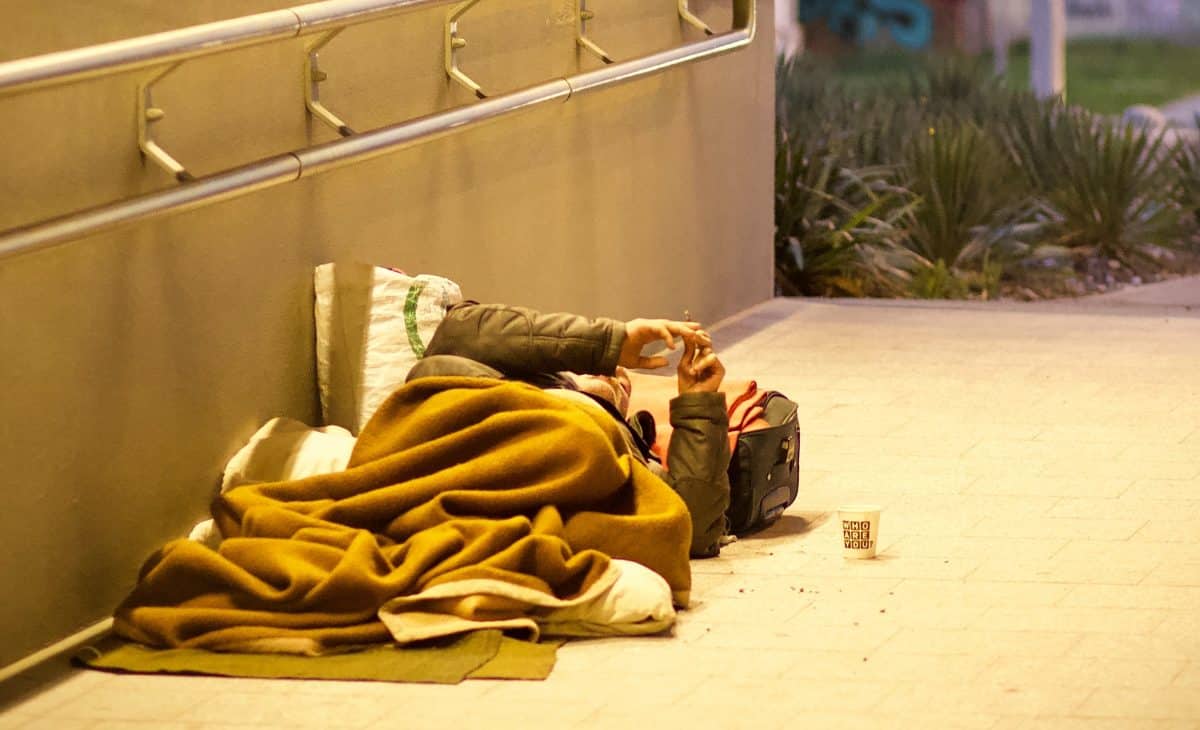
The church has a thinking problem. The same ideas keep popping back up generation after generation. Our answers about the poor seem to rise up from the basement of bad ideas as we mumble that Jesus says, “The poor you will always have with you.” The church has a thinking problem when it comes to the poor. I am interested, to borrow the title of a recent book, in “how the word is passed”. Why do humans continue to repeat the same use of oppression? Why do humans continue to demean, enslave, oppress, and exterminate others – sometimes in the name of democracy, sometimes in the name of God, and sometimes both?
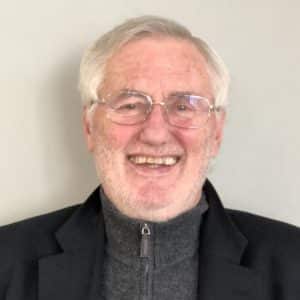
Rodney Kennedy
The voice that cries “I am” blends with the wind, the street noise, the stock market cacophony, and the denials of the rich. We know the cries are important, but they are unsettling, and they make such scary demands. Poor people have been hollering down the corridors of history for centuries, fighting for freedom, begging for bread, making up stories for mere survival, dying in the streets, dying under this flag or that flag, belittled by the rich, and denied by kings and elites and history. Sometimes these poor ones have just laid down and died. The way poor folk have been treated gets repeated in every generation with the sanctions of language, laws, politics, religion, and most of all that cruel master known as “economic necessity.” Somewhere today in the streets of the world’s cities the poor are groaning under their bitter lot, crying out from under the current Pharaoh “imposing tasks” and making “their lives bitter with hard service.”
I am interested in how humans have thought about the rich and the poor over the centuries. Ideas that take root in one era, grow spread like kudzu even when pernicious, untrue, and harmful to others. We now live in the age of the fastest dissemination of bad thoughts – unfiltered, unchecked, unverified thought – in history. People in Mississippi and Texas have been taking an anti-worming pill that veterinarians give to horses as a cure for COVID. A doctor in Mississippi told people, “You are not a horse.” Maybe, like the country singer, David Ball, we can all croon, “Yes, I admit, I’ve got a thinking problem.”
We have trouble with new ideas, even good ones. When the Wright Brothers first flew their plane over Hoffman Prairie in Dayton, Ohio, the press didn’t even bother to send a reporter. Do you know that Amos Root, publisher of Gleanings in Bee Culture, is the one who broke the story of the Wright Brothers and their genius? When the editor of the Dayton Daily News was asked some years later, why the newspaper didn’t cover the event, he said, “I guess the truth is that we were just plain dumb.”
I will venture a guess that practically everything you have ever been told about the poor is propaganda from rich people interested in protecting themselves. It’s like tobacco interests writing about smoking, the oil companies about the environment, Wall Street about regulations, and men talking abortion. Here’s one of their all-time winning ads: “The poor will be rich in heaven. Here on earth, they should accept their plight.” And the church helped produce this ad. Rich people, powerful people, high society, the 1%, the billionaires, have been promoting a bill of goods, and it has blinded us to the poor. Studies show that middle-class and poor working Americans will vote against their own economic self-interest to protect the rich. Listen please, “When I win the lottery,” is not a good business plan.
The playbook for dealing with the poor was written by Pharaoh over 3,000 years ago. Pharaoh convinced the Hebrew people that they were better off as his slaves. Here’s what they said to Pharaoh: “You have saved our lives; may it please our Lord, we will be slaves to Pharaoh.” This is the oldest of the ideas about the rich and the poor. The rich convince the poor to accept this plight and enslave them for economic profit. Philosopher Michel Foucault details the way this kind of thinking isolates people and builds their relations wholly in terms of harsh economic realities. Liberals and conservatives, good Christians, all joined this parade against the poor – all with the same twisted, immoral, unethical way of thinking. When it comes to God, it is not the economy, it’s justice.
The Pharaoh’s idea about peasants has matured over the centuries. People think the poor deserve to be poor. People think that the poor have to be policed and locked in jail. As Mrs. Turpin, in Flannery O’Connor’s short story, “Revelation,” screamed at God: “Go on,” she yelled, “call me a hog! Call me a hog again. From hell. Call me a wart hog from hell. Put that bottom rail on top. There’ll still be a top and bottom!”
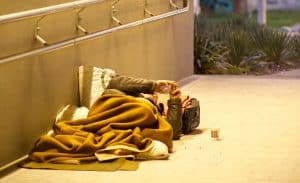
Mihály Köles / Unsplash
Pharaoh’s old playbook is dusted off and used again and again. After all, it was Pharaoh who said, “You shall no longer give the people straw to make bricks, as before; let them go and gather straw for themselves. But you shall require of them the same quantity of bricks as they have made previously; do not diminish it, for they are lazy.” Pharaoh’s politics are still a force in our republic.
For centuries now, people have thought the same thoughts about poor people being lazy. Cornell West cries out in horror, “On the domestic front, [the Pharaoh playbook] expands police power, augments the prison-industrial complex, and legitimates unlimited male power (and violence) at home and in the workplace. It views crime as a monstrous enemy to crush (targeting poor people) rather than as an ugly behavior to change.” And the churches are up to our steeples in defending, propping up, and maintaining the status quo.
As surely as a 21st century Christian clings to a literal 6-day creation, many people cling to outdated opinions about the poor. The poor are supposed to be grateful for the crumbs that fall from the table. But I say unto you, that our God is not a God of crumbs, but a God of enough loaves of bread to feed the world. God’s breadbasket is one of generosity and abundance.
Now, there’s an urgent need for us to think new thoughts about the poor. Now, we need some words of ancient wisdom endowed with new power: “Those who oppress the poor insult their Maker, but those who are kind to the needy honor him” (Proverbs 14:31). When will we learn that God is going to treat us the way we treat the poor?
It is easy to despair of hope in our time because we have elevated the worst of human vices to the throne of human power. We have raised a generation of politicians who get by on smoke and mirrors, on deceit and deception, on fear and fearmongering. They are witty and masters of the one-liner, but there’s no “there” there. Politics has become what Plato once saw as the essence of evil rhetoric: a kind of flattery, a fake art. Plato’s comparison of rhetoric to “cookery” seems on point. Politics has become like “cooking” where the cooks are not chefs but simply follow a cookie-cutter recipe from Pharoah’s cookbook.
If we are going to have old ideas, let’s have the decency to bring back “good” old ideas – like the witness of the Hebrew prophets. As Cornell West writes, “In the face of callous indifference to the suffering wrought by our imperialism, we must draw on the prophetic. The Jewish invention of the prophetic commitment to justice is one of the great moral moments in human history. This was a commitment to justice of an oppressed people. It set in motion a prophetic tradition based on the belief that God had imparted this love of justice because God is first and foremost a lover of justice.” A just God shows partiality to the poor.
We need tough, hard-nosed preachers who have matriculated in the school of the Hebrew prophets with Amos as major professor and dissertation advisor, with a post-graduate fellowship with Jesus – the champion of the poor. Jesus not only takes the side of the poor, Jesus himself was poor. No place to lay his head. No clothes except the ones on his back. Homeless Jesus. Unemployed Jesus. Poor Jesus. Peasant Jesus. When Jesus says, “The poor you always have with you” he was talking about himself. Jesus was a poor Jewish peasant.
Don’t try to sell me this Jesus, the middle-class entrepreneur and businessman who made expensive yokes for rich farmers from his Nazareth carpenter’s shop. And don’t even try to tell me that Jesus came up with a business plan and sold “franchises” to other carpenters in other towns and became rich and successful. I’m not buying this set of bad ideas. The Scripture is clear: “Jesus, though he was rich, yet for our sake, he became poor.” While Joseph was a carpenter and Jesus must have learned from him how to work with wood, in the end he was nailed to pieces of wood and all he had was one garment on his back.
Jacques Derrida suggests that bees lack eyelids and thus always see. They know a lot but can’t learn. They lack the ability to close off sight – that shutting of the eye at regular intervals – which Derrida links to being able to listen better. Whereas “man can lower the sheath, adjust the diaphragm, narrow his sight, the better to listen, remember, and learn.” Playfully, Derrida seeks “to cultivate an art of blinking.” In this way, we will be able to imagine life differently than it now is.
This is important because when it comes to a world of the rich and the poor, we seem incapable of imagining another way of life. From Pharaoh’s playbook to the present, we have mostly been an “unblinking” people. Now, it is time for us to blink so that we can see and hear the voices of the poor. I’m telling you that everything depends on the moment when God hears the cry of the oppressed and sends someone to say, “Let my people go.”
An actual involvement with the poor of our land will be our final hope. I think that any church needs to be engaged in the formation of people who can love the poor and become people who have learned to live as the poor by living with the poor. A church that desires to have what it teaches be disciplined by the Gospel must have at the center of their work something like a Catholic Worker house or a homeless shelter or a social service agency. Here is a possible starting place for thinking differently.
I’m neither challenging the ideology of the right nor endorsing the ideology of the left. I am a preacher in the tradition of the prophets, schooled by the teachings of Jesus. I am a man of one word: “Repent!” Change our minds before it is too late. What if we would have to walk very different paths in very different ways for the ethics/politics of Jesus to have much sense at all? A completely new paradigm. A different path is necessary now because our situation is as urgent as an aching in the gut.
This hunger for a curiosity consumed by the “question of knowing if one can think differently than one sees” is a vital and central aspect of the church. Unless we are able to make this a power once again in our churches, we will not be able to imagine ways of eliminating hunger and the system of mindless, commodified labor, disciplinary power, systems of reward and punishments, and the theodicies of history that sanction and uphold the entire system.
I am attempting to push us beyond the limits of our thought, our ways of knowing. Now we go forth beyond the edge, into the darkness, to go where no persons have gone before. Now, like Abraham, we go not knowing where we are going.
Rodney Kennedy has his M.Div. from New Orleans Theological Seminary and his Ph.D. in Rhetoric from Louisiana State University. The pastor of 7 Southern Baptist churches over the course of 20 years, he pastored the First Baptist Church of Dayton (OH) – which is an American Baptist Church – for 13 years. He is currently professor of homiletics at Palmer Theological Seminary, and interim pastor of Emmanuel Friedens Federated Church, Schenectady, NY. His sixth book – The Immaculate Mistake: How Evangelicals Gave Birth to Donald Trump – is forthcoming in the next few months from Wipf and Stock (Cascades).


